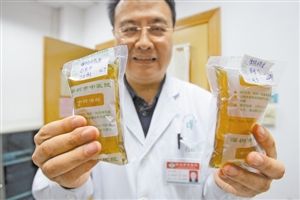Fund set up for H7N9 treatment
 0 Comment(s)
0 Comment(s) Print
Print E-mail China Daily, April 9, 2013
E-mail China Daily, April 9, 2013
The Guangdong provincial government announced on Sunday it has set up a fund to help H7N9 patients in financial difficulties, although no human infection has been reported in the province.
 |
|
A hospital in Shenzhen, Guangdong Province, develops a traditional Chinese medicine to prevent bird flu. |
Lin Shaochun, vice-governor of Guangdong, said all preparations will be conducted properly and there will be no delays in, or denials of, treatment for patients who have failed to pay medical bills. Lin was speaking at a conference on H7N9 avian flu prevention and control on Saturday.
The fund is meant to help H7N9 patients with financial difficulties, such as low-income people without medical insurance and migrant workers unable to pay for medical treatment.
The first sum for the fund, totaling 30 million yuan ($4.83 million), is in place. The provincial health and finance departments are working on rules for the use and management of the fund.
H7N9 patients covered by urban or rural insurance will receive refunds for medical treatment.
Zhong Nanshan, a leading specialist in respiratory diseases who is leading an expert team on bird flu prevention in Guangdong, said on Saturday the government should provide emergency funds and medical help in an urgent public health incident like an H7N9 epidemic.
He suggested the government allocate special funds to allow patients to receive free treatment or reductions in medical spending.
The fund will not only relieve the financial burden of patients, but also support the use of the detection reagent, vaccine development and related laboratory work, he said.
Zhong's remarks on free treatment sparked much discussion of the subject.
Lin Jiang, dean of the public finance and taxation department at Sun Yat-sen University in Guangzhou, said free treatment, like that in the SARS (Severe Acute Respiratory Syndrome) epidemic in 2003, is only viable when human-to-human infection happens, which is not the case with the H7N9 epidemic at the moment.
"When human-to-human infection happens, patients' health is harmed and the public is also affected," Lin told Yangcheng Evening News.
"If one person has H7N9 avian flu and the government uses public finance to treat him, it means all taxpayers are paying for the treatment of that person. It is unfair to all of the taxpayers."
He suggested government subsidies for H7N9 patients.
The first confirmed H7N9 patient in Nanjing, Jiangsu province, had used more than 90,000 yuan of his savings to pay for treatment, with nearly 10,000 yuan spent for every day of treatment in the intensive care unit, reported the Southern Metropolis Daily on April 4.
Despite donations of 10,000 yuan from the civil affairs authorities and 2,000 yuan from the community police, the family still owed more than 17,000 yuan to the hospital, although the hospital did not press the family for the money owned.
The family thought of selling their house to raise the money needed but gave up after their address was exposed online.
A H7N9 patient in Anhui province has reportedly used all her family's savings for her treatment.
The cases triggered debates on who should pay for the treatment of H7N9 patients.






Go to Forum >>0 Comment(s)